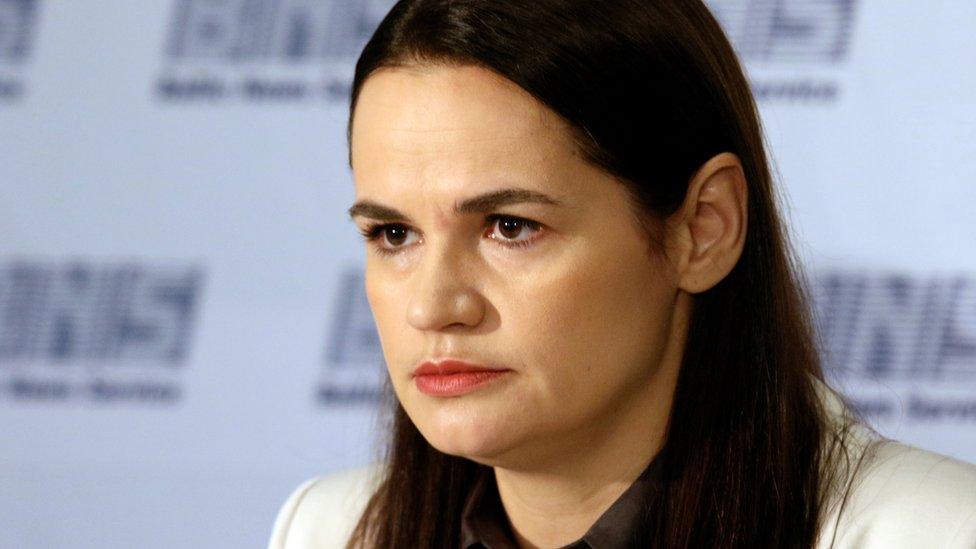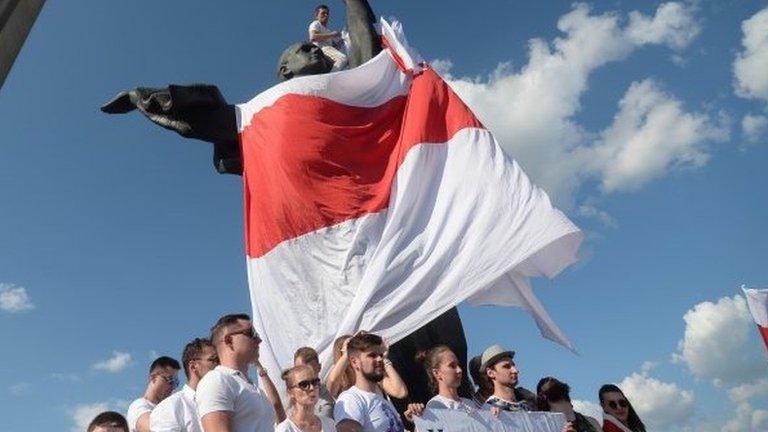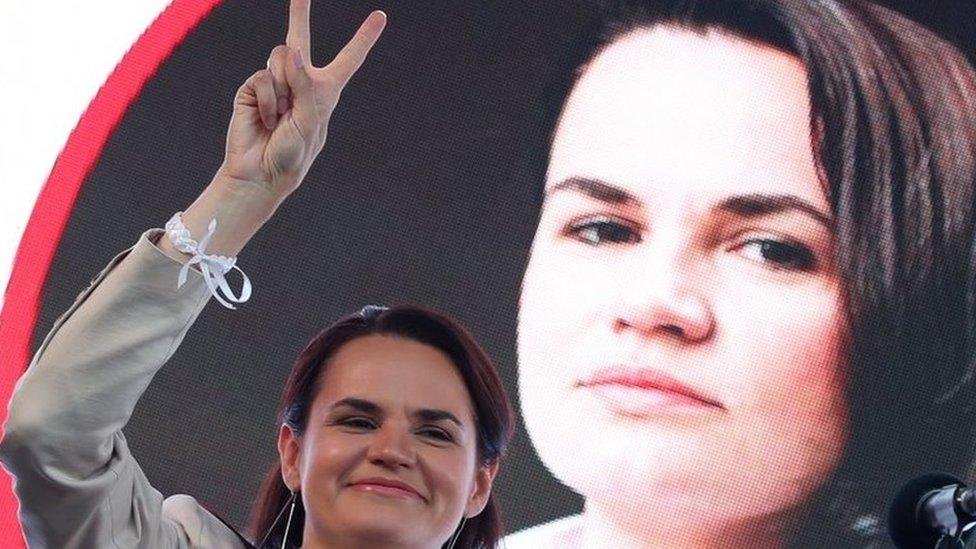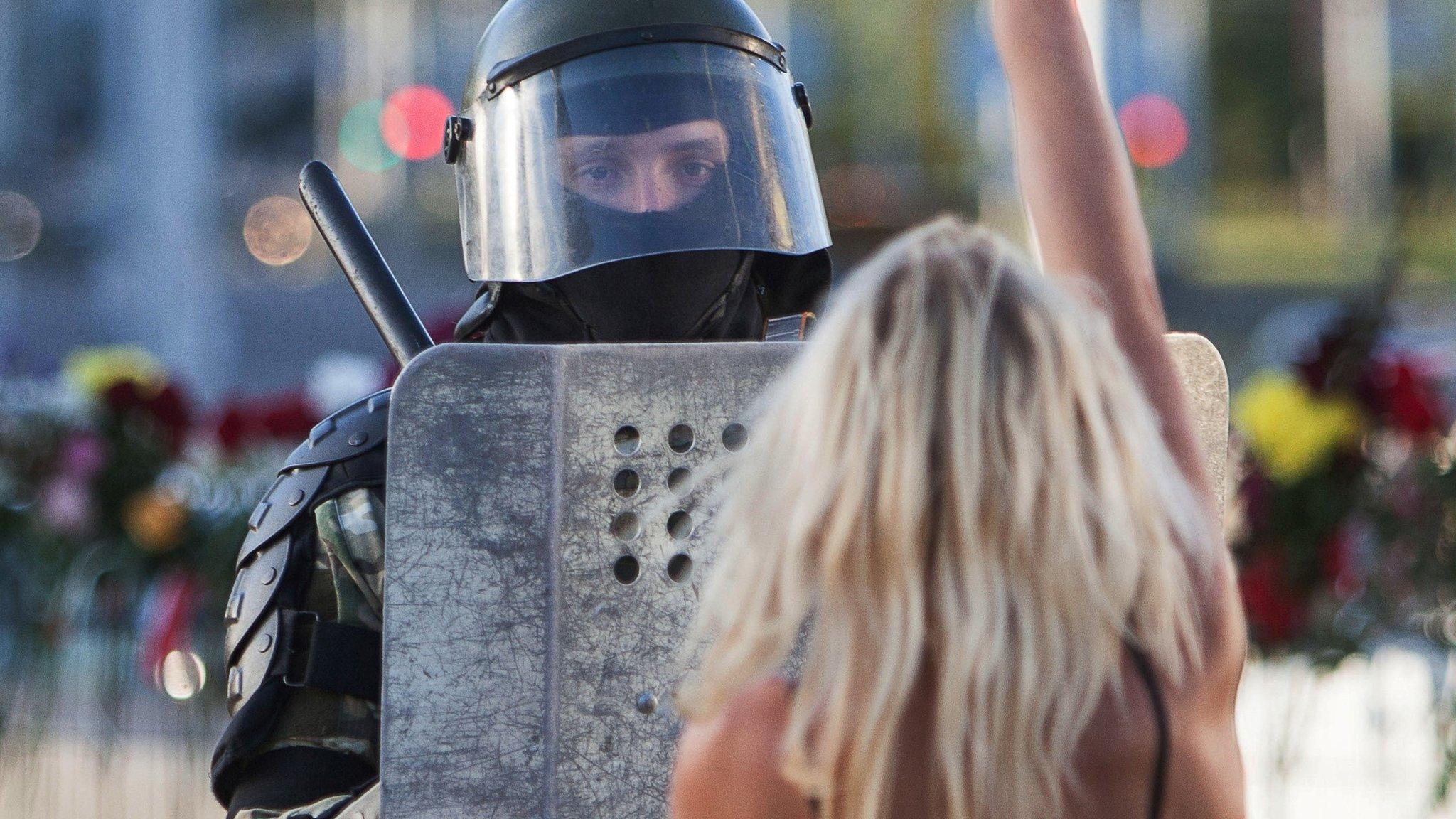Svetlana Tikhanovskaya: Belarus opposition leader to address UN Security Council
- Published
Dozens arrested in Belarus as they took to the streets over the 9 August election, widely believed to have been rigged
Exiled Belarusian opposition leader Svetlana Tikhanovskaya will address the UN Security Council, her team says.
She will speak via video link at the invitation of Estonia on Friday, and will address the Parliamentary Assembly of the Council of Europe next week.
She was forced to leave Belarus after veteran leader Alexander Lukashenko had been declared a winner in this month's disputed presidential election.
Pro-democracy campaigners have vowed to force Mr Lukashenko from office.
They say they will come out on the streets every week until he leaves.
Tens of thousands on Sunday occupied the centre of the capital Minsk for the third week in a row to protest about his victory, and dozens were detained there and in other cities. At least four people have died and hundreds have been injured in the unrest this month.
On Monday, Estonia, Lithuania and Latvia announced travel sanctions on 30 Belarusian officials, with Mr Lukashenko topping the blacklist.
"We said that we need peaceful dialogue and agreement between the regime and society, but we see that the regime is not ready for that. We see that we need to move forward and to show an example to other countries," Lithuanian President Gitanas Nauseda said.
The three Baltic states have been urging the West to take firmer measures against the Belarusian authorities, accusing them of rigging the 9 August presidential elections and brutally supressing the street protests that followed.
Meanwhile, the Belarusian officials have prevented the Roman Catholic Archbishop of Minsk and Mogilev, Tadeusz Kondrusiewicz, from returning to the country from neighbouring Poland. No reason was given for the decision.
The church has condemned the violence against protesters.
Mr Lukashenko has led the former Soviet republic of Belarus since 1994, maintaining close relations with neighbouring Russia, on which the country relies heavily for energy supplies and trade.
On Sunday, Mr Lukashenko spoke on the phone with Russian President Vladimir Putin. The two leaders agreed to meet in Moscow in the coming weeks, the Kremlin said.
Last week, Mr Putin warned that he had formed a police reserve force to intervene in Belarus if necessary, but added that that point had not yet been reached.
Where else is Tikhanovskaya speaking?
Ms Tikhanovskaya's press team announced that she would also address the Strasbourg-based Parliamentary Assembly of the Council of Europe on 8 September.
Russia, President Lukashenko's chief backer, is a permanent member of the UN Security Council, and it is unclear if it will try to stop the Belarusian politician speaking.
Last Monday, Ms Tikhanovskaya told the European Parliament's Foreign Affairs Committee that government intimidation could not stop the protesters. "We will not relent," she said, speaking from the Lithuanian capital Vilnius. "We demand to respect our basic rights. We demand all political prisoners be free."
Since moving to Lithuania, the opposition leader has called on Belarusians to continue to demonstrate peacefully against Mr Lukashenko.

Svetlana Tikhanovskaya
Election authorities gave Mr Lukashenko 80% of the vote but Ms Tikhanovskaya said she had won 60-70% based on results that had been properly counted.
On Sunday, the president's 66th birthday, protesters faced off with riot police in Minsk and at least 140 arrests were made.
Protesters chanted "disgrace" and "leave" in standoffs with police.
On Saturday, the authorities withdrew the accreditation of 17 reporters, most of them Belarusian citizens who had been reporting for foreign media outlets including two journalists with the BBC's Russian service.
- Published8 September 2020

- Published1 August 2020

- Published13 August 2020
